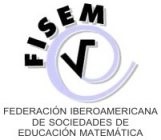A observação em aula como ferramenta de desenvolvimento profissional
o caso da OCDE Global Teaching InSights
Resumo
Presenta-se o projeto Global Teaching InSights Video Study da Organização para a Cooperação e Desenvolvimento Econômico [OCDE], cujo objetivo é promover a gravação e análise das sessões de aula como ferramenta de desenvolvimento profissional e formação de professores de matemática. Descreve-se o trabalho realizado pelos autores coordenando grupos de trabalho que se encarregaram de desenhar um estudo de caso com base em um vídeo de uma aula real. A divulgação pública dos vídeos produzidos também permite abordar o desenho da pesquisa voltada para a observação orientada da prática do ensino de matemática.
Downloads
Referências
Alsina, À., Mulà, I. (2019). Advancing towards a Transformational Professional Competence Model through Reflective Learning and Sustainability: The Case of Mathematics Teacher Education. Sustainability, 11, 4039. https://doi.org/10.3390/su11154039
Borko, H., Jacobs, J., Eiteljorg, E., Pittman, M. E. (2008). Video as a tool for fostering productive discussions in mathematics professional development. Teaching and Teacher Education, 24 (2), 417–436. https://doi.org/10.1016/j.tate.2006.11.012
Boston, M. D., Candela, A. G. (2018). The Instructional Quality Assessment as a tool for reflecting on instructional practice. ZDM, 50 (3), 427–444. https://doi.org/10.1007/s11858-018-0916-6
Coles, A. (2013). Using video for professional development: the role of the discussion facilitator. Journal of Mathematics Teacher Education, 16 (3), 165–184. https://doi.org/10.1007/s10857-012-9225-0
Coppola, C., Di Martino, P., Pacelli, T., Sabena, C. (2012). Primary teachers’ affect: A crucial variable in the teaching of mathematics. Nordic Studies in Mathematics Education, 17(3-4), 101–118.
Danielson, C. (2013). Enhancing professional practice: A framework for teaching (2nd ed.). Association for Supervision and Curriculum Development.
Hattie, J., Timperley, H. (2007). The power of feedback. Review of Educational Research, 77(1), 81-112. https://doi.org/10.3102/003465430298487
Hiebert, J., Grouws, D. A. (2007). The effects of classroom mathematics teaching on students’ learning. En F. K. Lester Jr. (Ed.), Second Handbook of Research on Mathematics Teaching and Learning (pp. 371–404). NCTM, Information Age.
Karsenty, R. (2018). Professional development of mathematics teachers: Through the lens of the camera. En G. Kaiser, H. Forgasz, M. Graven, A. Kuzniak, E. Simmt, B. Xu (Eds.), Invited Lectures from the 13th International Congress on Mathematical Education (pp. 269–288). Springer.
Linder, S. M. (2011). The facilitator’s role in elementary mathematics professional development. Mathematics Teacher Education and Development, 13 (2), 44–66. https://mted.merga.net.au/index.php/mted/article/view/41/156
Muñiz-Rodríguez, L., Alonso, P., Rodríguez-Muñiz, L. J., De Coninck, K., Vanderlinde, R., Valcke, M. (2018). Exploring the effectiveness of video-vignettes to develop mathematics student teachers’ feedback competence. EURASIA Journal of Mathematics, Science and Technology Education, 14 (11), 1–17. https://doi.org/10.29333/ejmste/92022
Organisation for Economic Co-operation and Development [OCDE]. (2021). Global Teaching InSights. OECD Publishing. https://www.globalteachinginsights.org/
Organisation for Economic Co-operation and Development [OCDE]. (2020). Global Teaching InSights: A Video Study of Teaching. OECD Publishing. https://doi.org/10.1787/20d6f36b-en
Pólya, G. (1945). How to solve it? Princenton University Press.
Ramos, P., López, J. J., Miguel, C., Rodríguez, J. J., Villaseñor, L. (2022). Using Geometry to Help Us Solve Quadratic Equations. OECD Publishing. https://www.globalteachinginsights.org/media/Using+Geometry+to+Help+us+Solve+Quadratic+Equations/1_k7gh4x9i
Rodríguez-Muñiz, L. J., Muñiz-Rodríguez, L., Álvarez Llano, C., Quidiello Villa, P., Castro López, M. L., Blas Prieto, P., Madrid-Salvador Olmedo, M. (2022). Scaffolding Mathematical Problem Solving. OECD Publishing. https://www.globalteachinginsights.org/media/Scaffolding%20Mathematical%20Problem%20Solving/1_zv71xmx9
Santagata, R. (2009). Designing video-based professional development for mathematics teachers in low-performing schools. Journal of Teacher Education, 60 (1), 38–51. https://doi.org/10.1177%2F0022487108328485
Treffers A (1987). Three dimensions. A model of goal and theory description in mathematics instruction–the Wiskobas project. D. Reidel Publishing.
Van Es, E. A., Sherin, M. G. (2008). Mathematics teachers’ “learning to notice” in the context of a video club. Teaching and Teacher Education, 24 (2), 244–276. https://doi.org/10.1016/j.tate.2006.11.005
Zaslavsky, O., Leikin, R. (2004). Professional development of mathematics teacher educators: Growth through practice. Journal of Mathematics Teacher Education, 7 (1), 5–32. https://doi.org/10.1023/b:jmte.0000009971.13834.e1
Zehetmeier, S., Krainer, K. (2011). Ways of promoting the sustainability of mathematics teachers’ professional development. ZDM Mathematics Education, 43 (6), 875–887. https://doi.org/10.1007/s11858-011-0358-x
Direitos de Autor (c) 2023 Irene Ferrando;Laura Muñiz-Rodríguez,Pedro Ramos,Luis J. Rodríguez-Muñiz

This work is licensed under a Creative Commons Attribution 4.0 International License.
O material publicado na revista é distribuído sob a licença Creative Commons International Attribution 4.0 (CC-BY 4.0). Esta licença permite que outros distribuam, misturem, ajustem e desenvolvam seu trabalho, mesmo para fins comerciais, desde que você seja creditado com a criação original. Os autores das obras publicadas na Revista Unión mantêm seus direitos autorais sem restrições.
##plugins.generic.dates.accepted## 2023-03-15
##plugins.generic.dates.published## 2023-04-28








.png)






